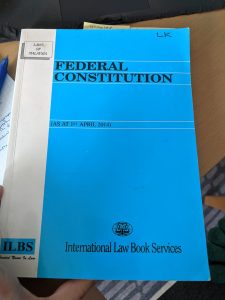There are hundreds of laws in Malaysia that have been passed in the Parliament. And of course, you’re not expected to know all of them by heart. But there is one major, crucial piece of law that you should know…at least in summary: The Federal Constitution.
You’ve probably heard of it before and if you go to certain bookstores, you’ll find copies of it being sold there. They usually look like this, but sometimes they come in different colours:
Essentially, the Federal Constitution holds the set of laws that the running of the country is based on. It covers the main laws such as citizenship laws, ministerial obligations and just the general rights afforded to Malaysian citizens.
In this article, we’ll be looking specifically at the rights that are listed under the Federal Constitution. Do note that there are several rights, but we’ll be listing just 5 of them here for now (and maybe we’ll do a Part 2 or 3 to this article later).
1. The right to life and personal liberty
Article 5(1) of the Constitution says:
No person shall be deprived of his life or personal liberty save in accordance with law.
What this means is that every person has the right to freedom and to live a life of quality. ‘Save in accordance with the law’ here means that the only time this right might be taken away from you is if the law permits it. An example of this would be if you had to be detained for investigations or be imprisoned if you committed a crime.
However, even if you are detained and imprisoned, there are proper procedures that should be followed and your rights cannot be totally absolved.
2. Protection against retrospective criminal laws and repeated trials
Article 7 of the Constitution is pretty short and has two paragraphs which say:
(1) No person shall be punished for an act or omission which was not punishable by law when it was done or made, and no person shall suffer greater punishment for an offence than was prescribed by law at the time it was committed.
(2) A person who has been acquitted or convicted of an offence shall not be tried again for the same offence except where the conviction or acquittal has been quashed and a retrial ordered by a court superior to that by which he was acquitted or convicted.
Not sure what whatever you just read means? No worries, that’s what we’re here for. Basically, it says:
- You can’t be punished for something which wasn’t even a crime when you did it. So, you can’t be punished retrospectively.
- If you’re found guilty, you can’t be given a bigger punishment than what the law stated at the time you committed the offence.
- You can’t be tried twice for the same offence/crime once the case is ‘closed’. The only exception to this is when a higher court than the one who tried you asks for a retrial. For example, if your case was decided in the High Court, the Court of Appeal (the next highest court) can ask for a retrial
3. Right to equality before the law
This can be found under Article 8 of the Federal Constitution, where it says:
(1) All persons are equal before the law and entitled to the equal protection of the law.
The rest of the Article goes on to say that unless the Constitution expressly says otherwise, everyone has the right to get protection under the law regardless of their religion, race, descent, place of birth or gender.
An interesting fact is that prior to 2001, the word “gender” didn’t exist in the Article. But in that year, the government had committed to the Convention on the Elimination of All Forms of Discrimination Against Women 1979 (Cedaw), and that is when it was set in stone that there should also be no discrimination on the basis of gender.
This article also covers discrimination in employment under a public authority or any law that has to do trade, business, profession, vocation or employment.
4. Right to freedom of speech, assembly and association
Article 10 is a rather ‘heavy’ Article, in that it covers three main things:
a. The right to have freedom of speech
b. The right to assemble peaceably and without arms
c. The right to form associations
But despite them being separate rights, they are still interrelated, if you really think about it.
Now although you are given these rights, you should know that Parliament can pass laws to limit some of them if it’s in the best interests of the public to do so. Essentially, your right to have all these freedoms cannot outweigh the wellbeing of society.
Besides this, there can also be limits placed on the right to freedom of speech when it comes to labour and education laws.
5. The right to have an education
Article 12 of the Constitution says that no one should be discriminated against based on religion, race, descent or place of birth (similar to Article 8), if they are seeking education.
Every citizen should have the right to enrol in a public education institution, and they should not be discriminated against in receiving financial aid from a public authority.
However, institutions that are run by religious groups have the right to admit only pupils of their own religion. And speaking of religion, no student is required to take instructions or partake in any ceremony/act of worship that is not of their own religion. As for who determines a child’s religion, this right is given to their parent or guardian until the child is 18 years old, after which the child has the right to decide for themselves.
Like we said, we could only cover 5 rights in this article, as the Federal Constitution is a very lengthy and thorough piece of legislation. Look out for a follow-up article on this in the near future, and we hope you learned a thing or two about the Federal Constitution today!


